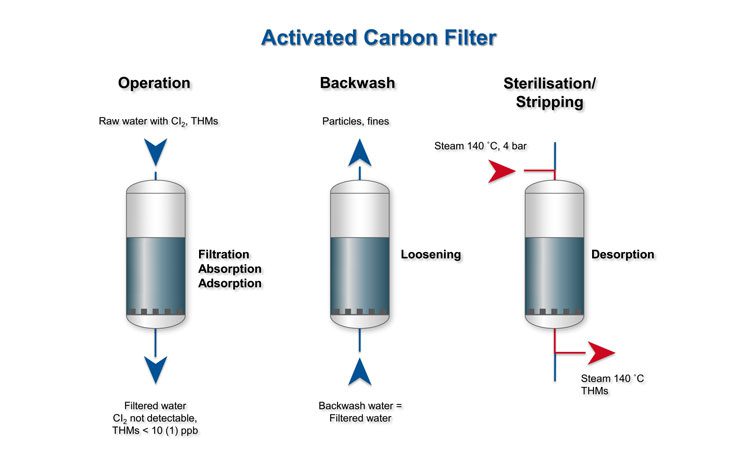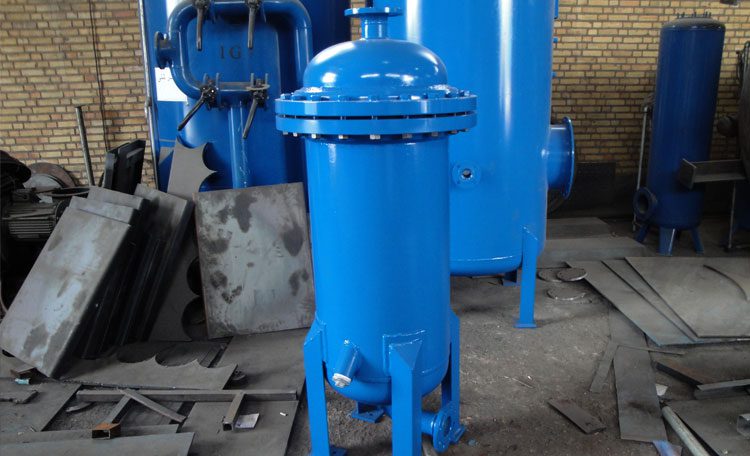Carbon filter or activated carbon is one of the common methods in water and wastewater treatment systems, which is based on the absorption of organic matter in water by activated carbon. Removing the turbidity, odor and taste of water is one of the main tasks for activated carbon filters and therefore is widely used in domestic water treatment systems, swimming pools and even industrial wastewater treatment. To get acquainted with the method of water treatment with carbon filter, application, advantages, disadvantages, price of carbon filter (activated carbon) and design and production of activated carbon filter, stay tuned to Haft Industrial Group.
What is a carbon filter?
The presence of organic matter in water, all of which have a carbon structure, has a negative effect on its quality and greatly affects its turbidity, odor and taste. Carbon filter or activated carbon filter is active in reaction with organic matter due to the presence of activated carbon and immediately absorbs organic matter and causes a large amount of contaminants in the water to be removed. The instantaneous bonding of organic matter in the water with the outer surfaces of the activated carbon filter is the main reason for the absorption of organic matter by these filters.
Water treatment method with activated carbon filter
The general structure of water purifiers that operate with activated carbon filters includes a tank, inlet valve, silica, activated carbon and outlet valve. The body of the activated carbon filter is often made of steel, carbon steel with epoxy paint or FRP. Water with a pH at the neutral level enters the tank through the inlet valve and loses organic matter by passing through the carbon layers, and finally by passing through the suspended silica, the suspended solids are removed and the water is clear and odorless, tasteless and colorless. It is transferred from the outlet valve to the outside of the tank.
The important point in making carbon filters is that in addition to activated carbon, these filters also use silica, which has a very important role in absorbing suspended solids in water. First, a layer of silica is placed and covered with carbon. The passage of suspended particles and the adsorption of organic matter by carbon filters over time causes a jelly layer to form on it, which drastically reduces the performance of the filter. Therefore, it is necessary to clean and regenerate the filter by various methods such as backwashing with backwash.
Types of carbon filters
Carbon or activated carbon filters are divided into different groups according to the type of carbon and its particle size, which are:
· Granular Activated Carbon Filter
· Powdered Active Carbon Filter
· Active Carbon Filter Block
Granular carbon filter (GAC), also known as sand carbon filter, as its name implies, treats water with small grains the size of carbon sand. The contact surface of water with carbon sand grains is less than its powder type and therefore has a lower efficiency. Powdered activated carbon filter or PAC has the highest contact surface with water droplets and has the ability to absorb organic matter and remove the color, odor and taste of water in it more than other types. Block carbon filters have less adsorption power due to the large size and dimensions of the carbon, but can work better in removing suspended matter in the water than the previous two. In general, GAC and PAC are often used in water purifiers.
Activated carbon is made from wood, coal and coconut husk, which is produced in various ways such as thermal activation and chemical activation. Due to the excellent absorption of carbon produced by the coconut husk, this type of carbon is often used for water treatment systems with carbon filters. It should be noted, however, that activated carbon from coconut husk is more expensive than other filters.
Application of activated carbon filter
The high absorption power of organic matter and the removal of opaque color and odor and unpleasant taste of water with the help of carbon filters has made its application very widespread. Applications of activated carbon filter include the following options:
Carbon filter in drinking water treatment
The turbid color of water indicates the presence of harmful organic matter in it, which provides the environment for the growth of microbes and microorganisms and are highly effective in the development of gastrointestinal diseases. The use of water purifiers with carbon filter method causes the color of the water to be completely removed and the passage of water through the charcoal filter will also remove its smell and taste. The use of these filters in drinking water treatment eliminates the need to use disinfectants and in addition, the chlorine in the water is removed.
Reverse osmosis pretreatment
In order to increase the efficiency and improve the efficiency of water treatment systems such as reverse osmosis, a pre-treatment step is considered. Installing carbon filters in the RO pre-treatment stage is a big step to remove the organic matter and chlorine in it, which increases the life of reverse osmosis filters.
Pool water purifier
Consecutive use of pool water eventually leads to discoloration and growth of germs and microorganisms. Using a water purifier with sand filter and carbon filter is one of the best ways to clean pool water, which will cost less than other methods. Due to the fact that carbon filters have a high absorption power, therefore, there is no need to use a lot of chemicals and disinfectants to clean the pool water. This choice will not only reduce costs, but also contain less harmful chemicals and chlorine, and ensure the health of the skin and body.
Industrial wastewater treatment
The turbid color of industrial wastewater indicates the organic matter in it, which is called gray water. Because activated carbon filters are very effective in removing turbid water, they can be a good option for industrial wastewater treatment and recycling to save water.
Advantages of water treatment with carbon filter
Activated carbon filters are widely used in water purification systems for several reasons, the most important of which are the following:
· Remove color, odor and taste in water
· Removal of chlorine, benzene, radon, THM compounds
· Remove H2S from water
· Easy and cheap installation and maintenance
· Easy backwashing
Disadvantages of activated carbon filter
Despite all the advantages mentioned for activated carbon filters, it is important to know that this group of water and wastewater treatment systems are incapable of removing some of the chemicals and contaminants in the water. For example, an activated carbon filter does not have the ability to remove the following substances from water:
· Solutes, salts, arsenic, copper, nitrate, TDS, asbestos
· Sediment removal
· Nitrates and bacteria
Activation methods of activated carbon filter
Like other water and wastewater treatment equipment, activated carbon filters will eventually lose their efficiency due to high absorption of organic matter. As a result, it is necessary to take the necessary measures to revive them. In general, two methods of back wash and reverse steam flow are used for this purpose. The movement of water in the opposite direction from the filter causes a large volume of jelly material deposited on silica and carbon to be removed from the surface and transferred out of the tank. In the reverse steam flow method, the carbons are in contact with the steam for 30 minutes and are regenerated.
Price of activated carbon filter
When buying a carbon filter, in addition to paying attention to the quality and efficiency of the device, it is necessary to consider the price of the carbon filter. The difference between the price of activated carbon filter produced and available in the market depends on several important factors, the most important of which are the manufacturer brand, size, model, body material and amount of carbon. For information on the price of carbon filter produced by Haft Industrial Group, you can use the communication channels mentioned at the bottom of the page.
Design and production of carbon filter
Haft Industrial Group, as one of the most experienced collections of industrial water and wastewater treatment equipment, has designed and produced carbon filter in its activities. In the design and manufacture of activated carbon filter in this group of engineers with experience and expertise in the field of water and wastewater and all the necessary standards are used during the design of each product. Due to the very high diversity of Haft Industrial Group products and assigning unique features to each of them, the experts of this collection provide the necessary tips and advice before buying carbon filters and other equipment.









